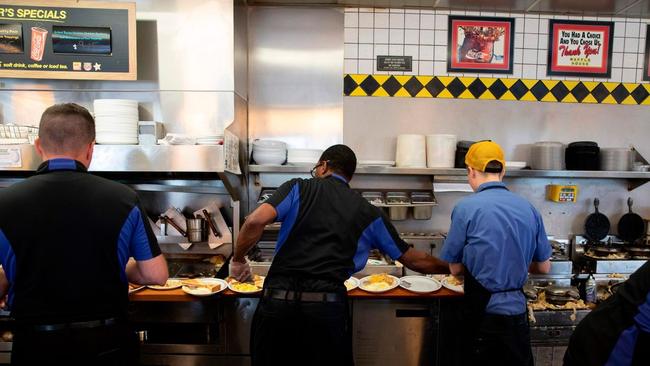All-hours diner sets manager standard
Being prepared to muck in when things get tight is just one desired attribute.

Since she graduated from Harvard last year, Yehong Zhu has worked for Amazon.com and Twitter in Seattle, San Francisco and London. She’s living in Lisbon now, gathering ideas for her own start-up.
In 2014, however, the jetsetting Zhu was just another teenager looking for a summer job. And the only place willing to hire her was Waffle House.
On her first day, smiling nervously behind a bright-yellow name tag, Zhu had no idea that her new manager, a woman named Diana, was about to become a lasting leadership role model. “I was very impressed with her,” she says. “She was the first to arrive and one of the last to leave, and seemed to have a handle on everything. She thrived under pressure, and pressure at Waffle House is constant.”
Waffle House is a closely held suburban Atlanta-based chain of 24-hour budget diners in 25 states that invariably reek of bacon. The company does not advertise, rarely changes its menu and refused to take credit cards until 2006.
As the son of a southerner, I’ve eaten there many times. But I’ve never slid out from one of its booths thinking I’d just witnessed management greatness. I got that idea from Bill Hestir, a reader in South Carolina who sent me an email containing one irresistibly provocative sentence: “I have come to believe that a successful Waffle House manager could succeed in almost any retail job in America.”
To be clear, nobody (including Bill) is arguing that all 1950 Waffle Houses are shipshape operations. The company’s unscientific 3.3 employee rating on Glassdoor beats rivals such as Denny’s and IHOP but trails McDonald’s. Worker reviews often contain gripes about long hours, chronic absenteeism, gruelling holiday shifts, and drunk and belligerent customers. There are also darker allegations involving employee theft, drug abuse, racism and sexual harassment. “Don’t be surprised if you find out your cook didn’t show up because he was in jail,” one reviewer says.
It’s difficult to imagine how Waffle House attracts good managers, let alone operates a viable business. But the fascinating thing is that somehow it does. The company declined to disclose its financials but most estimates of its annual revenue exceed $US1bn ($1.5bn). Waffle House says the share price of its employee-owned stock, which is based on its audited book value, has increased every year for the past 57. The company says it typically opens about 50 new restaurants a year.
In reality, these statistics attract plenty of managers. And because Waffle House promotes exclusively from within, the good ones are rarely inclined to leave. “It’s probably one of the last places where you seriously have the ability to build wealth,” says Randy Coleman, a former Walmart store manager who defected to Waffle House in 2005.
What does it take to be a successful Waffle House manager?
Speed, for one thing. To meet the goal of serving every customer in eight minutes or less, the waitstaff don’t bother punching orders into a computer. They write them down in a shorthand code and read them aloud to cooks, who remember them by arranging condiments on empty platters. A face-up mustard packet signifies pork chops, for instance. If the restaurant is busy or short-staffed, managers are expected to dive in.
This may sound like stopwatch overkill. But company president and chief executive Walt Ehmer, speaking on a recent podcast, says doing the grunt work is good for business. It helps managers earn the trust and respect of their teams while staying connected to the entire operation.
“You learn a lot about what’s working and what’s not,” he says.
Once they tackle the pace, the next challenge is endurance. Put simply, Waffle House never closes. If there’s a crisis in the dead of night, the manager inevitably gets a call. If there’s one supreme testament to their stamina, it’s the “Waffle House Index”. After a hurricane, the US Federal Emergency Management Agency uses these stores as an informal way to measure the damage. (If the local Waffle House had to shut down, it must be bad).
One surprise, given its relatively low bar for hourly workers, is the company’s emphasis on team-building. To encourage retention, it offers managers bonuses for keeping turnover low. To discourage them from overworking people, it expects stores with high sales figures to have higher staffing costs, too. This policy surprised Coleman. At Walmart, he says, generating big sales with minimal employee hours was “a good thing”.
Compared with other workplaces she has known, Zhu says, managers at Waffle House generally don’t dump work on other people, take more credit than they deserve or pretend to be nicer than they are just to get something. “That kind of thing doesn’t fly,” she says.
These boxy diners don’t win design awards but there may be no place more conducive to discouraging self-importance. The hanging lights give off a warm, inviting glow and the jukeboxes are stocked with hokey tunes. On his first visit, food writer Anthony Bourdain picked up on the unpretentiousness. After tucking into an order of pecan waffles, he declared Waffle House “better than the French Laundry”.
Beneath the folksiness is a strong current of calculated capitalism. Tipped servers know that being a team player helps them land lucrative shifts. And entry-level managers earning as little as $45,000 know that if they persevere for five years, they’re liable to receive stock options and earn as much as $117,000.
Here’s the obvious question: could any manager benefit from serving a few orders of smothered and covered hash browns?
“It wouldn’t hurt,” Zhu says. “At Waffle House, nobody coddled me. I couldn’t do anything to make myself sound impressive. You have to develop a reputation for doing what you say you’re going to do.” Maybe, she adds, “it could help with the entitlement you see in office environments”.
The Wall Street Journal
Sam Walker, a former Wall Street Journal reporter and editor, is the author of The Captain Class: A New Theory of Leadership.



To join the conversation, please log in. Don't have an account? Register
Join the conversation, you are commenting as Logout